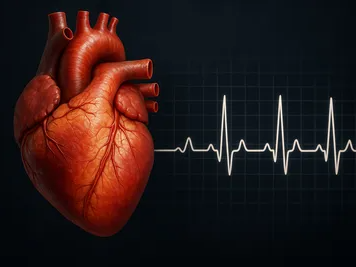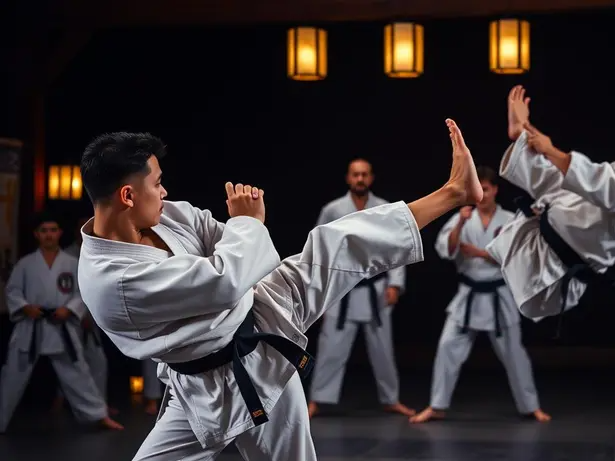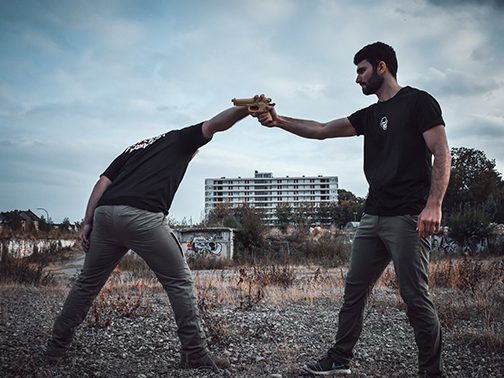Lower Your Heart Rate Before Sleep

Lower Your Heart Rate Before Sleep
A martial artist’s guide to recovery and control
When you train hard, your body works like a machine under stress. But when the training is done, your body needs the opposite: calm, recovery, and deep rest. Lowering your heart rate before sleep is one of the simplest ways to accelerate recovery, improve sleep, and sharpen your focus for the next session.
The good news is that you can improve it immediately and for free. I cannot overstate its importance. This might be the most impactful health skill you can learn.
In this article, we’ll cover:
- What is heart rate before sleep (HRBS)
- Why it matters
- How to measure it
- What a good score looks like
- A simple protocol to improve it
What is HRBS?
Your heart rate before sleep (HRBS) is the number of times your heart beats per minute while lying quietly right before bed. It’s a direct reflection of how your nervous system is doing.
Your HRBS reveals your:
- Fitness level
- Metabolic health
- Recovery status
- Stress management
For martial artists, it’s like checking your “inner pulse” of readiness. After an intense sparring session or heavy conditioning, your HRBS tells you whether your body is ready to rebuild or still fighting the effects of stress.
A lower HRBS means your parasympathetic system (the “rest and digest” part of your nervous system) is active. This is when your body repairs muscle fibers, balances hormones, and consolidates skill learning — the hidden part of training that happens while you sleep.
Why it’s important
Lowering your heart rate before bed helps you fall asleep faster and stay asleep longer. It’s also linked to better longevity, emotional control, and performance under pressure. Poor sleep and chronically high HRBS can cause:
- Higher risk of heart disease and hypertension
- Slower recovery from training
- Increased hunger and weight gain
- Irritability and poor decision-making
- Lower reaction time and focus
Think of it like sparring without rest rounds. Eventually, your system burns out. A calm, low heart rate before bed ensures your body gets those “rest rounds” it needs to stay sharp.
How to measure it
You can measure HRBS in two easy ways:
- Using a wearable
- If you have a smartwatch or fitness tracker, just check your app before sleeping. Most devices track heart rate automatically.
- Manually
- Lie flat on your back. Breathe slowly for about a minute. Then, count your pulse for 15 seconds and multiply by 4. That’s your HRBS.
Example: 70 beats in one minute = 70 bpm.
What’s a good score?
A great HRBS score is around 50 bpm. This reflects an efficient heart and a relaxed nervous system. It’s common among fighters and athletes with good conditioning.
It often means:
- High stroke volume (your heart pumps more blood per beat)
- Strong vagal tone (good control of your nervous system)
- High aerobic capacity
If your HRBS is in the 60s, 70s, or even higher, don’t worry. You can improve it quickly by adjusting habits around sleep and recovery.
If it’s consistently below 40 or above 80 and you feel dizzy or weak, check in with your doctor.
Your HRBS protocol
My own resting heart rate before bed predicts my sleep quality perfectly. When it’s low, I sleep deeply and recover fast. When it’s high, I feel sluggish the next day — no matter how long I stay in bed.
Here’s a protocol to help you lower yours:
1. Four hours before bed
Finish your last meal. Avoid heavy foods like pasta or fried dishes. Large meals raise your heart rate because your body diverts energy to digestion.
2. No alcohol or caffeine
Alcohol raises your heart rate and disrupts deep sleep. Caffeine stays in your system for hours. Stop it before noon.
3. Avoid high-intensity training at night
Finish sparring, strength work, or cardio at least four hours before sleep. Late workouts keep your body in fight mode.
4. Control your light and screens
Turn off screens an hour before bed. Use warm or red light instead of bright white.
5. Calm your mind
Stress raises HRBS faster than anything else. Don’t get into arguments or heavy work right before bed. Do something grounding: stretch, read, breathe, or journal.
6. Cool, dark room
Keep your room cool, dark, and quiet. Your body drops in temperature to fall asleep, and a cooler room helps this natural process.
7. Consistent bedtime
Go to bed at the same time every night. The nervous system loves rhythm.
Things that raise your heart rate before bed
- Alcohol: +5 to 10 bpm
- Anxiety or stress: +5 to 25 bpm
- Late caffeine: +2 to 5 bpm
- Intense evening training: +4 to 10 bpm
- Large meals: +10 bpm
- Nicotine: +10 bpm
- High room temperature: +5 bpm
- Dehydration: +5 bpm
The martial artist’s advantage
As martial artists, we already train awareness. We control breath under pressure, manage adrenaline, and stay calm in chaos. The same skills that help you in a fight can help you sleep better.
Before bed, think of it like the end of a sparring round. Exhale. Release tension from the shoulders. Slow your breathing. Let your body shift from fight mode to recovery mode.
These are the invisible rounds that make you better. Recovery is part of training.
The encouraging part
You will see results fast. Your heart rate can drop within days of changing your habits. A lower HRBS tonight means better sleep tomorrow. Better sleep means faster recovery and sharper focus in your next class.
Your progress is entirely in your control.
If you want to take it further, join a martial arts school listed on FightMore. We’ve collected hundreds of schools that help people like you train smarter, not just harder. Find one near you, build discipline, and master both sides of the fight, action and recovery.
Ook iets voor jou?
Karate Martial Arts: The Basics
Unleash your inner warrior! 🌟 Discover the ancient art of karate from Okinawa, blending fitness and self-defense. What if mastering this discipline could change your life? 🥋✨

What Are the Differences Between IKMF and KMG?
Deciding between IKMF and KMG for Krav Maga? Unlock the secrets to self-defense mastery! Discover their unique philosophies and find your perfect fit today!

When you’re in trouble, no one is coming
In a crisis, crowds can be deadly! Discover why you shouldn't count on strangers to save you and learn how to prepare yourself instead! Don't miss this eye-opener!

Reacties (0)
Je moet inloggen om een reactie te kunnen plaatsen.
Nog geen reacties. Wees de eerste die reageert!